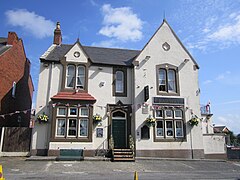Seneley Green
| Garswood | |
|---|---|
| Village | |
 The Railway public house, Garswood |
|
| Garswood shown within Merseyside | |
| Population | 6,183 |
| OS grid reference | SJ556993 |
| Civil parish |
|
| Metropolitan borough | |
| Metropolitan county | |
| Region | |
| Country | England |
| Sovereign state | United Kingdom |
| Post town | WIGAN |
| Postcode district | WN4 |
| Dialling code | 01942 - 01744 |
| Police | Merseyside |
| Fire | Merseyside |
| Ambulance | North West |
| EU Parliament | North West England |
| UK Parliament | |
Garswood is a village in the Metropolitan Borough of St Helens, Merseyside, England. The village is near to neighbouring Ashton-in-Makerfield and within a civil parish called Seneley Green.
Historically within Lancashire, Garswood is from Old English wudu "wood" with an uncertain first element. The name was recorded as Gratiswode (undated).
Garswood has seen, along with extensive farming, much coal mining activity in its past, due to strata running up to an adjacent fault causing much outcropping of coal seams. Mining has taken place using (comparatively) shallow shafts and many drifts. The last drift mine in the Garswood area, Quaker House Colliery, closed in 1992. Extensive opencast mining has taken place in more recent times and still continues in the area.
The village contains the Railway Hotel, the Stag Hotel and the Simms Road Inn public houses. It also has a Labour Club and a Conservative Club.
In 1588 Seneley Green (as it was then known) became the site of Ashton-in-Makerfield Free Grammar School, the area's first free grammar school, founded by Robert Byrchall on land granted for the purpose by Sir Thomas Gerard. Whilst the original building has long since demolished, today the site is used as Garswood Public Library. Ashton-in-Makerfield Free Grammar School was attended by Saint Edmund Arrowsmith, one of the Forty Martyrs of England and Wales.
...
Wikipedia

